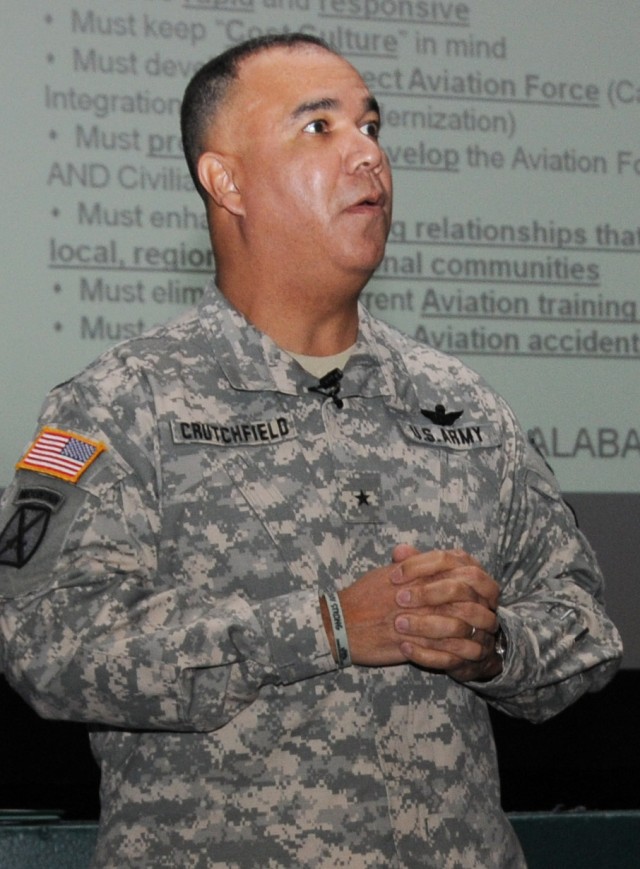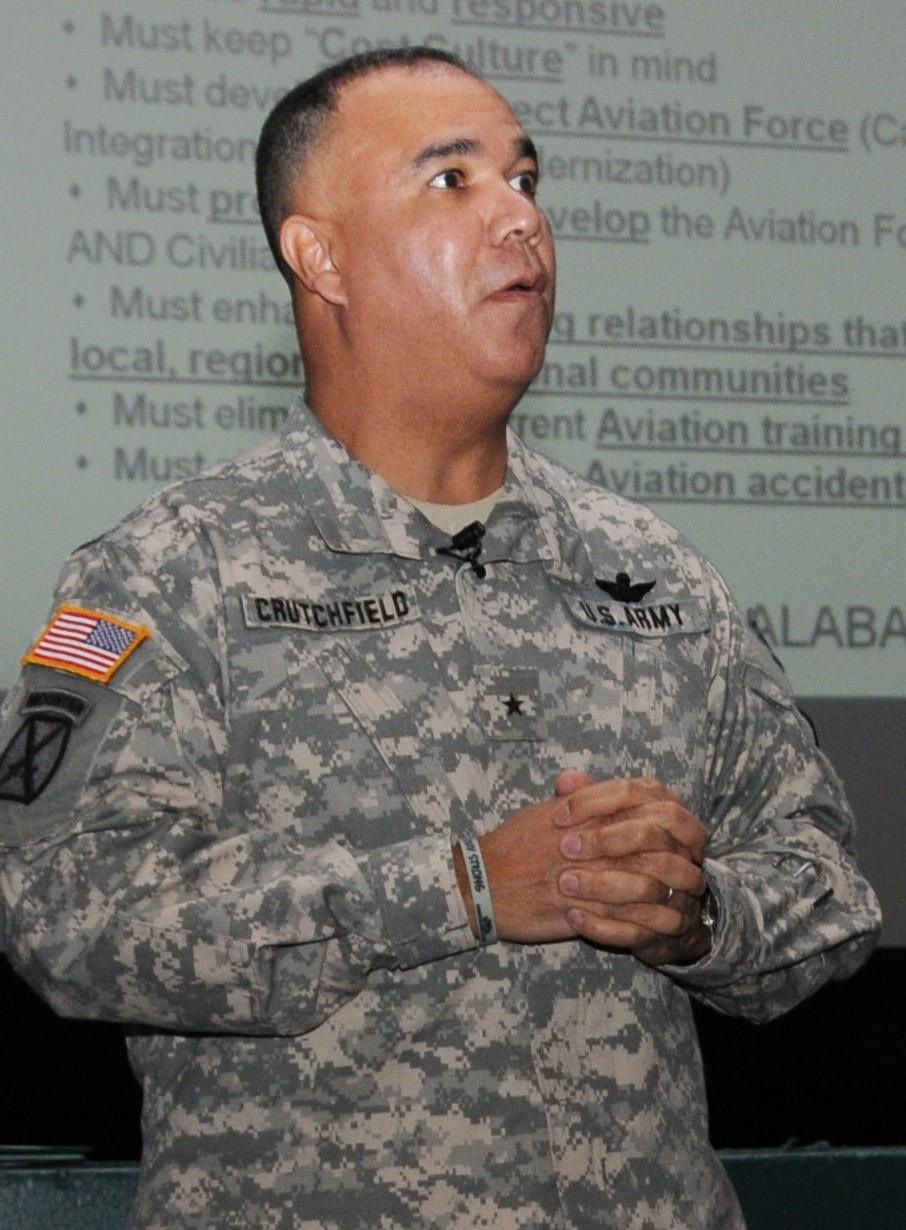FORT RUCKER, Ala. -- The U.S. Army Aviation Center of Excellence and Fort Rucker commanding general spoke at the garrison Workforce Briefing Jan. 18.
Brig. Gen. Anthony G. Crutchfield thanked garrison personnel for the work they do daily to support Families and servicemembers, and shared his intent and imperatives as commanding general.
"I wish I could get around and see everybody all the time," Crutchfield said. "I try to but there's just one of me. When I heard you all were going to be here I thought I'd personally thank you for what you do."
He said he reviews every single Interactive Customer Evaluation he is sent and is pleased with what he reads.
"There's a few of you in here I wish I could package and clone you, and make everybody like you," Crutchfield said. "Because I will assure you, people who write ICE comments, if they are saying something positive they don't have to do that."
The general mentioned he's begun writing letters of thank you to people he sees receiving good comments repeatedly and delivering them personally.
"It's not much, I know that, and if you try to sell it online, you won't get anything out of it," he said. "But it's a way that I can say 'thank you,' personally. I want all of you to strive to get that letter and if all of you do, I'll write a letter for everybody on this post."
Crutchfield also shared his support of the Leading Change Team and encouraged people to get involved.
The LCT is a way to make important changes for Fort Rucker and for the Aviation Branch. He asked people to "come forward with their ideas to make our post, our lives and our branch better."
Crutchfield quoted the saying, "If you continue to do what you did, you'll always get what you got."
"The point is if you continue to do things because that's the way it's always been, you will always be what you are now. You will never be any better ... ever," he said.
Crutchfield shared his passion for Fort Rucker and Army Aviation, saying the post is where he began his career.
"I'm the first generation of Aviator, general officer that grew up in the branch that is now the leader of the branch. I've seen it from the beginning of the branch," he said. "When I found out I was coming to Fort Rucker I spoke with anyone who would have an office call with me and asked them two questions. What does Army Aviation do for you' And how can we improve'"
After he thought about all the answers he received he came up with the commander's intent and imperatives.
"I'm sharing all of this with you because you're part of my team and I can't do this without you," Crutchfield said.
After he finished talking to all the people he wrote down some things that have got to be done in Army Aviation.
"I call them imperatives not priorities," Crutchfield said. "Because a priority is from top to bottom - imperatives, you have to do everything.
"We've got to work as a team," he said. "We're doing great, but we could be doing better. Think about who you need to work with and how you can improve."
Crutchfield explained cost culture means accomplishing the mission at best cost.
He also said he is dedicated to making sure Soldiers and the civilian workforce receive opportunities for professional education. Soldiers are required to do professional military education for promotions.
"The Army is not very good at educating our civilian workforce and we've got to do better," Crutchfield said.
He said that by building relationships both locally and nationally the Aviation Branch and Fort Rucker will benefit. If people don't know what we're doing beyond the Wiregrass area or Montgomery, Ala., then we won't get the things we need to improve and accomplish our mission.
"I just want to let you know that I acknowledge your hard work and I appreciate what you do," Crutchfield said.
After Crutchfield spoke, Col. James Muskopf, Fort Rucker garrison commander and Justin Mitchell, Fort Rucker garrison deputy commander recognized several people for their hard work and volunteerism in support of the garrison. They presented medals, awards and certificates of appreciation.
After the awards, Wes Hedman, Aviation Safety Specialist, spoke about the Leading Change Team and how it will help the garrison and Army Aviation. He also shared how people can become members of the team.
Mitchell then discussed the newly reinstated reveille and retreat procedures and talked about entertainment and educational opportunities for garrison employees.
Muskopf recognized the importance of Crutchfield's visit to the briefing. He said that a lot of what Crutchfield talked about applied across the board to all people on Fort Rucker, not just Aviation.
"So much of what we do is the fact that we are a service organization," Muskopf said. "We render a service to our people that if we do treat every private like we do every general officer we will come a long, long way to accomplishing our goals and objectives."
He also thanked garrison personnel for all the work they do.
"Shortly after I got here I said that my worst day here at Fort Rucker is better than my best day at the Pentagon, and it's still true today," Muskopf said. "I wasn't talking bad about the Pentagon, I was talking about how good it is to be here. I couldn't be happier with the workforce I have here."
Commander's intent:
Nothing is more important than how we train and sustain the flow of highly qualified Aviation professionals to rapidly meet the demands of Commanders worldwide and expertly employ the full spectrum capabilities Aviation brings to the Army and Joint Force. Trained by strong leaders, they are mentally, spiritually, and physically tough and are unsurpassed in their commitment. We must ensure all our efforts are synchronized with ARFORGEN and our process must be impossible for any other organization to duplicate.
Crutchfield's Imperatives:
* Must work as a Team
* Must be rapid and responsive
* Must keep "Cost Culture" in mind
* Must develop the correct Aviation Force (Capabilities Integration and Force Modernization)
* Must professionally develop the Aviation Force (Soldiers AND Civilians PME)
* Must enhance the strong relationships that exist with local, regional and national communities
* Must eliminate the current Aviation training backlog
* Must significantly reduce Aviation accidents


Social Sharing